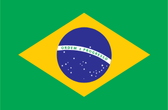
Call 0330 880 3600 Calls may be monitored or recorded. Opening Times.
- TRAVEL INSURANCE
- COVID-19 COVER
- More Options
- Help & Advice
- Existing Customers

Call 0330 880 3600 Calls may be monitored or recorded. Opening Times.

Need help?
UK Customer Services0330 880 3600*
Open Monday to Friday 9:00am to 6pm, Saturday 8:30am to 4pm and closed Sundays.
*Calls are recorded for training and quality purposes.

Official name: Federative Republic of Brazil
Capital city: Brasília
Languages spoken: Portuguese (official), Spanish, English, French
Population: Around 217 million
Currency: Brazilian Real (BRL)
Time zone: GMT-3 (most regions, multiple time zones)
Driving side: Right
Climate: Tropical rainforest, semi-arid interior, and temperate south
Brazil is the largest country in South America, famed for its Amazon rainforest, vibrant cities, and world-renowned beaches. With iconic attractions such as Rio de Janeiro’s Christ the Redeemer, the Iguaçu Falls, and the energy of Carnival, Brazil offers culture, wildlife, and natural wonders in equal measure.
Brazil’s landscape is vast and varied, stretching from the Atlantic coast to the Amazon Basin. It includes tropical rainforests, wetlands, mountains, and endless beaches. The climate ranges from humid equatorial in the north, to dry savannah in the centre, to cooler temperate zones in the south.
Domestic flights connect the main cities and regions, while buses remain a popular way to travel overland. Crime can be a concern in major urban areas - especially Rio de Janeiro and São Paulo - so visitors should stay vigilant, avoid displaying valuables, and use registered taxis or ride-hailing apps.
British nationals do not need a visa for tourist visits of up to 90 days. Passports should be valid for at least six months after arrival. For stays longer than 90 days, or for work and study, an appropriate visa must be obtained. The Brazilian Embassy in London or local consulates can provide guidance.
The official currency is the Brazilian Real (BRL). ATMs are widely available in urban areas, and most hotels, restaurants, and shops accept international credit cards. Carrying cash is recommended when visiting smaller towns or local markets.
Private hospitals in large cities offer good healthcare, but rural areas can be limited. Comprehensive travel insurance with medical cover is strongly advised. Recommended vaccinations may include yellow fever, hepatitis A, and typhoid, depending on the region. Mosquito-borne diseases such as dengue and malaria are present in some areas, so precautions against bites are essential.